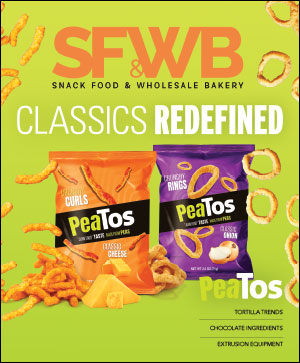Snack producers and bakeries frequently seek new opportunities to streamline processing to improve efficiency and streamline throughput. Such improvements can save money, thereby providing a competitive advantage in today’s highly competitive market.
We recently reached out to Liran Akavia, co-founder and COO, Seebo, Tel Aviv, Israel, to learn more about how the company’s process-based artificial intelligence (AI) can help with this process by revealing hidden causes of inefficiencies and recommending the corrective actions.
Douglas J. Peckenpaugh: Please describe some of the key features in Seebo’s advanced process-based AI technology of interest to snack and bakery industry product manufacturers.
Liran Akavia: The Seebo solution is made of three key parts, which address the three most-pressing questions facing snack and bakery manufacturers: Why do process-driven losses occur (e.g., net weight overweight; size, shape, and color inconsistencies; etc.)? How can they be prevented? When should the production team take preventative action?
First, automated root-cause analysis reveals the hidden causes of the process inefficiencies that cause production losses in quality, waste, yield, and throughput. With continuous multivariate analysis of all data sources and tags, process experts gain new insights and traceability into their processes, and can pinpoint the specific causes of losses, which are often the result of the combination of numerous factors, rather than one set point or data tag on the line.
Then predictive recommendations use those insights to provide the precise optimal range for your production line, to avoid those losses in the future.
Finally, predictive alerts deliver clear instructions to the production team, in real time, whenever an inefficiency occurs. This enables the production teams to act fast and nip the problem in the bud, preventing losses before they occur.
DJP: I understand that a recent customer was dealing with product rejects due to underweight issues. How did Seebo diagnose this problem?
LA: This company has 4,200 employees, across 38 sites worldwide. Their annual turnover is €1.2 billion and they belong to the food and beverage industry, focused on a baked goods production line in Western Europe.
The company in question had significant process-related losses on their toasted bread line, particularly losses due to net weight underweight. Their process experts were unable to locate the root cause, because there were no clear culprits—all the data tags in question were operating within the permitted ranges.
After unifying and enriching all their disparate data, Seebo used artificial intelligence to reveal the hidden causes of losses, including from rejects due to underweight. Those process inefficiencies were invisible to the human eye, as they were caused by a complex combination of behaviors among the hundreds of interrelated data tags on the line.
Seebo found 38 interrelated factors that together were causing underweight issues. To give one example: When the baking temperature was above 204˚C, and the baking conveyor speed was less than 5 meters per second, instances of underweight increased several fold.
This complex combination of issues wasn’t spotted by process experts because the tags in question (for example, the temperature and conveyor speed) were within their permitted ranges. With hundreds of data tags and even more interrelationships between the different tags, it was simply impossible for their process experts to ever pick up on this unique behavior.
Now the process experts knew what ranges to avoid, and the production team receive alerts whenever those ranges occur—complete with SOPs instructing them how to correct the issue in real-time.
DJP: What was the result of implementing these process improvements?
LA: After implementing the recommendations from Seebo, the company cut instances of waste due to underweight from 7.4% to just 2.2%. That improvement, together with improvements in other areas (specifically concerning the size and shape of the bread), led to annual savings of nearly is €1.0 million on that single production line. The manufacturing team also gained 138 new insights about their production line, which provide long-term value for achieving continuous improvement.
DJP: What are some other common problems that companies run into as part of snack and bakery operations that Seebo can address?
LA: Every single production line is unique, which is why we built our proprietary process-based artificial intelligence to understand the unique complexities of each individual production line.
That said, we do see a lot of similar process-related losses across the industry, and that’s reflected in the work we do with our customers, like Barilla, Mondelez, Nestlé and General Mills. Some of the most-common losses we see are rejects due to weight, size, and shape variability, color inconsistencies, quality variables (e.g., moisture), net weight underweight, and raw material variables.








